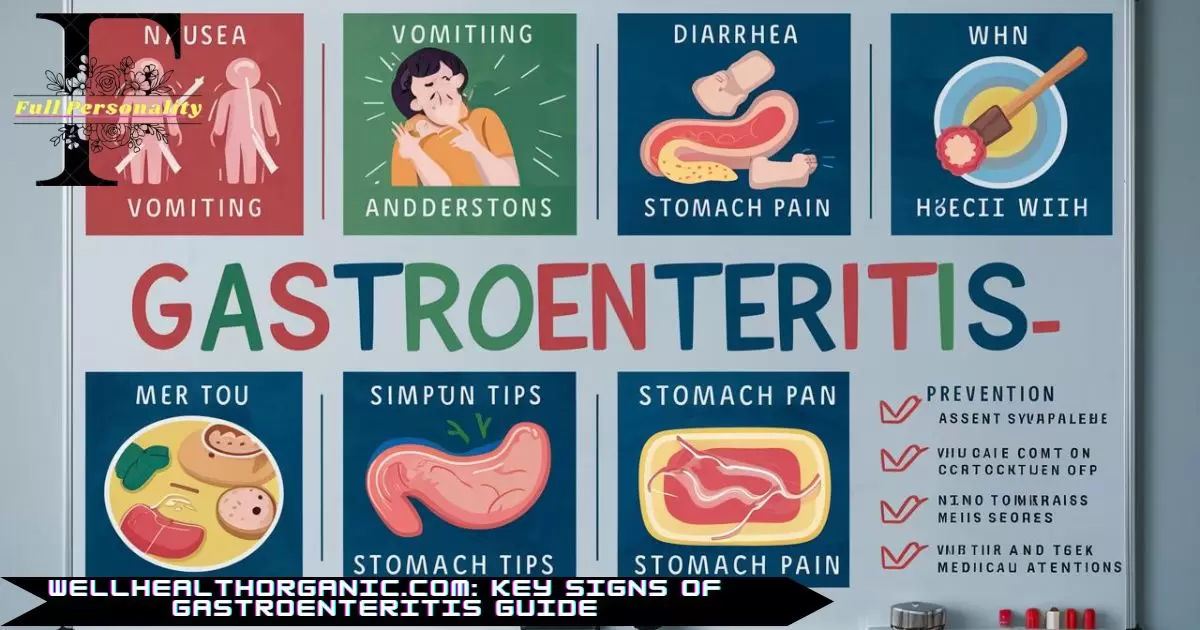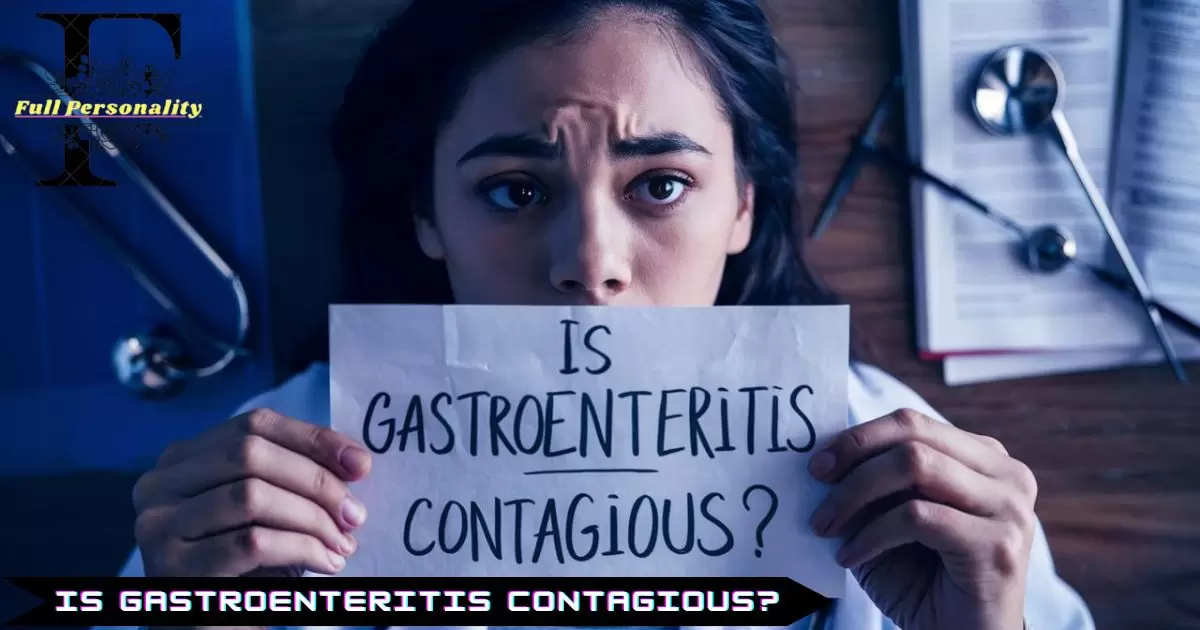Gastroenteritis, often dubbed the “stomach flu,” can knock you off your feet faster than you can say “upset tummy.” But what exactly is this pesky condition, and how can you spot it? Let’s dive into the nitty-gritty of gastroenteritis, from its telltale symptoms to effective treatments and prevention strategies.
What Is Gastroenteritis?
Gastroenteritis is a very common condition that causes diarrhea and vomiting. It’s usually caused by a bacterial or viral tummy bug. It affects people of all ages but is particularly common in young children. Most cases in children are caused by a virus called rotavirus.
Picture your digestive system as a bustling highway. Gastroenteritis is like a massive pile-up, causing traffic jams and chaos throughout. Your body’s natural response? To flush out the troublemakers as quickly as possible, often resulting in a not-so-pleasant experience for you.
You may want to Read: well health how to Build Muscle Tag: Simple Practical Guide
Gastroenteritis Symptoms
When gastroenteritis hits, it’s like your body’s throwing an unwanted party. The guest list? A motley crew of symptoms that’ll make you wish you could uninvite them all. Here’s what you might experience:
- Nausea: That queasy feeling that makes you wonder if you’re on a boat in choppy waters.
- Vomiting: The forceful ejection of stomach contents, often accompanied by a guttural “blegh!”
- Diarrhea: Loose, watery stools that have you sprinting to the bathroom.
- Abdominal cramps: Like tiny gremlins doing the cha-cha in your belly.
- Fever: A rise in body temperature, often accompanied by chills and sweats.
- Headache: As if your head’s in a vice grip.
- Muscle aches: Feeling like you’ve run a marathon, even if you’ve barely left the couch.
These symptoms can vary in intensity and duration, depending on the cause and your body’s response. Some folks might experience a mild case, while others could feel like they’ve been hit by a truck.
How long does gastroenteritis last?
The duration of gastroenteritis can feel like an eternity when you’re in the thick of it. However, most cases typically resolve within a few days to a week. It’s like a storm passing through, intense while it’s happening, but eventually, the skies clear.
For viral gastroenteritis, the most common type, symptoms usually peak within the first 24-48 hours. After that, you’ll gradually start feeling better. Bacterial cases might linger a bit longer, sometimes up to two weeks. But don’t worry, your body’s working overtime to kick those unwanted guests to the curb.
Stomach Flu and Children
Kids and gastroenteritis? It’s a combo that can strike fear into the hearts of parents everywhere. Children, especially the little ones, are more susceptible to dehydration, the biggest concern when it comes to gastroenteritis.
Watch out for these red flags in your mini-me:
- Dry mouth and lips
- Sunken eyes
- Decreased urination
- Lethargy or unusual fussiness
- Lack of tears when crying
If you spot these signs, it’s time to call the doctor. Remember, children can go from “a bit under the weather” to “seriously dehydrated” quicker than you can say “tummy trouble.”
You may want to Read: well health how to build muscle tag: Simple Practical Guide
Gastroenteritis Causes
Ever wondered what’s behind this gut-wrenching experience? Let’s unmask the culprits:
Norovirus
The notorious “cruise ship virus,” norovirus is like the ninja of gastroenteritis. It’s stealthy, highly contagious, and responsible for about 20% of all cases worldwide. This virus spreads faster than office gossip, through contaminated food, water, or close contact with an infected person.
Rotavirus
Before widespread vaccination, rotavirus was the bane of parents and daycares everywhere. It’s still a common cause of severe diarrhea in young children globally. Think of it as the playground bully of the virus world, it hits hard and fast.
Astrovirus
Less famous but still troublesome, astrovirus often targets kids under 5 and the elderly. It’s like the quiet kid in class who suddenly causes a ruckus.
Adenovirus
This overachiever doesn’t just cause gastroenteritis; it can also lead to respiratory infections. Talk about an all-in-one package you’d rather return to sender.
Bacteria
Bacterial gastroenteritis is like getting uninvited guests at your gut party. Common troublemakers include:
- E. coli: Often found in undercooked meat or contaminated produce.
- Salmonella: The reason why you shouldn’t lick the bowl after making cookie dough.
- Campylobacter: Frequently linked to undercooked poultry.
Other
Sometimes, gastroenteritis can be caused by parasites, toxins, or even certain medications. It’s like a grab bag of gut-disturbing possibilities.
You may want to Read: Understanding Your True Self with the Enneagram Personality Test
Stomach Flu Stages
Gastroenteritis doesn’t just hit you all at once. It’s more like a rollercoaster ride with distinct stages:
- Incubation: The calm before the storm. You’ve been exposed but don’t feel sick yet.
- Onset: Suddenly, bam! Nausea, vomiting, and diarrhea make their grand entrance.
- Peak: The worst of it. You’re probably camped out near the bathroom.
- Recovery: Symptoms start to ease. You begin to remember what it’s like to feel human again.
- Convalescence: You’re on the mend, but might still feel weak and need to take it easy.
Is gastroenteritis contagious?
Is the Pope Catholic? Does a bear. well, you get the idea. Yes, gastroenteritis is highly contagious, especially the viral kind. It spreads faster than wildfire, through:
- Close contact with infected individuals
- Contaminated food or water
- Touching contaminated surfaces and then your mouth
You’re typically most contagious when you’re experiencing symptoms and for the first few days after you recover. So, if you’re struck down by the stomach flu, do everyone a favor and stay home!
Gastroenteritis Risk Factors
Some folks are more likely to catch this gut-wrenching condition:
- Young children and older adults
- People with weakened immune systems
- Those living in close quarters (dorms, nursing homes, cruise ships)
- Travelers to areas with poor sanitation
- People who eat undercooked or raw foods
Stomach flu and pregnancy
Expectant moms, beware! Gastroenteritis during pregnancy can be more than just uncomfortable. it can potentially lead to complications if severe dehydration occurs. If you’re pregnant and suspect gastroenteritis, don’t hesitate to contact your healthcare provider.
Gastroenteritis Treatment
When gastroenteritis strikes, treatment is all about managing symptoms and preventing dehydration. Here’s your battle plan:
- Hydration: Water is your new best friend. Sip small amounts frequently.
- Oral Rehydration Solutions: These contain the perfect balance of water, salts, and sugar to replenish what you’ve lost.
- Rest: To combat the infection, your body requires energy.
- Gradual Return to Eating: Start with bland, easily digestible foods like bananas, rice, applesauce, and toast (the BRAT diet).
You may want to Read: Cosmos Persona Personality Test
Gastroenteritis medication
While there’s no cure-all pill for gastroenteritis, certain medications can help ease symptoms:
- Anti-diarrheal medications (for adults only)
- Anti-nausea drugs
- Pain relievers for fever and body aches
Always consult with a healthcare professional before taking any medication, especially if you’re pregnant or treating a child.
For infants and children
Treating little ones requires extra care:
- Continue breastfeeding or formula feeding
- Use pediatric oral rehydration solutions
- Avoid fruit juices and sodas, which can worsen diarrhea
When to Call a Doctor
Most cases of gastroenteritis clear up on their own, but sometimes you need to call in the cavalry. Seek medical attention if you experience:
- unable to consume drinks for a full day
- Bloody stools
- High fever (above 102°F or 39°C)
- Signs of severe dehydration
- Symptoms lasting more than a few days
Gastroenteritis Prevention
An ounce of prevention is worth a pound of cure, especially regarding gastroenteritis. Here’s how to keep those nasty bugs at bay:
- Wash your hands frequently and thoroughly
- Practice food safety (cook meats thoroughly, wash produce)
- Avoid close contact with infected individuals
- Clean and disinfect surfaces regularly
- Get vaccinated (rotavirus vaccine for infants)
Takeaways
Gastroenteritis might be a pain in the gut, but armed with knowledge, you’re better equipped to handle it. Remember:
- It’s usually caused by viruses or bacteria
- Symptoms include nausea, vomiting, diarrhea, and abdominal pain
- Most cases resolve within a few days to a week
- Hydration is key in the treatment
- Food safety procedures and proper cleanliness are key to prevention.
By understanding the key signs and symptoms of gastroenteritis, you can take action quickly and get back to feeling like yourself in no time. Stay healthy, stay hydrated, and may the odds be ever in your favor against the dreaded stomach flu.
You may want to Read: Aiotechnical.Com Health & Beauty
FAQs
What are the starting symptoms of gastro?
The opening act of gastro often features a sudden onset of nausea, like a wave of queasiness washing over you. This is quickly followed by abdominal cramps, as if tiny acrobats are performing somersaults in your belly.
What are the symptoms of gastro disease?
Gastro’s symphony of symptoms includes the infamous trio: nausea, vomiting, and diarrhea, often accompanied by abdominal pain. In addition, a fever, headache, and muscle aches are possible. it’s like your body’s throwing an unwelcome party and inviting all the wrong guests.
How do you confirm gastroenteritis?
Confirming gastroenteritis is like being a detective of your own body. Your doctor will typically diagnose based on your symptoms and a physical exam, but they might also request a stool sample to identify the culprit, it’s CSI: Gastro Edition.
What is the fastest way to cure gastroenteritis?
There’s no magic bullet to instantly cure gastroenteritis, but hydration is your secret weapon. Sip on clear fluids or oral rehydration solutions like you’re fueling up for a marathon, and rest like it’s your new full-time job.
What can be mistaken for gastroenteritis?
Gastroenteritis is the master of disguise in the medical world. It can be mistaken for food poisoning, inflammatory bowel disease, or even appendicitis. It’s like playing a game of “Guess Who?” with your symptoms.
What is the best antibiotic for gastroenteritis?
Antibiotics are usually not the go-to for gastroenteritis, as most cases are viral and antibiotics don’t work on viruses. However, if a bacterial culprit is confirmed, your doctor might prescribe antibiotics like ciprofloxacin or azithromycin. They’re like special forces troops targeting the bad guys in your gut.
What is the difference between gastritis and gastroenteritis symptoms?
Gastritis and gastroenteritis are like cousins, related, but distinct. Gastritis primarily affects the stomach lining, causing upper abdominal pain and nausea. Gastroenteritis, on the other hand, is the life of the party, involving both the stomach and intestines, leading to the full spectrum of digestive drama including diarrhea.
Conclusion
Gastroenteritis might be a gut-wrenching experience, but armed with knowledge, you’re now ready to face this intestinal invader head-on. Remember, hydration is your secret weapon, and your body’s a warrior that’ll fight off the infection given time and TLC. Don’t let the stomach flu catch you off guard, stay vigilant with prevention tactics and listen to your body’s signals.
When in doubt, don’t hesitate to reach out to your healthcare provider. They’re like the special ops team in your battle against gastroenteritis. Stay healthy, stay hydrated, and may your digestive system remain as peaceful as a zen garden.

Hello, I’m Andria Brown, the founder of Full Personality. With a background in SEO and three years of experience, I’ve always been fascinated by the ever-changing world of blogging. Full Personality is my platform to delve into the future of blogging. When not exploring tech trends, I focus on SEO and SERPs. I believe in building a community that shares ideas and stays ahead in innovation. Join me on this exciting journey!



